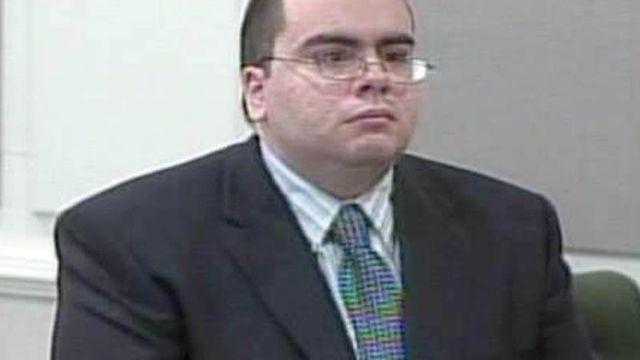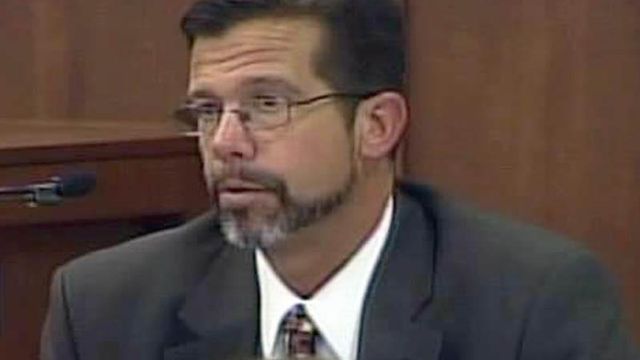Experts: Castillo didn't believe shootings were wrong
An Orange County man accused of killing his father and opening fire on his former high school three years ago understood the shootings were against the law but didn't believe they were morally wrong, two mental health experts testified Friday.
Posted — UpdatedAlvaro Castillo, 22, is charged with fatally shooting his father, Rafael Huezo Castillo, on Aug. 30, 2006, and then driving to Orange High School with a cache of weapons and opening fire. Two students were injured in the school shooting, which ended when school personnel tackled the gunman.
Castillo has pleaded not guilty by reason of insanity, and he told Superior Court Judge Allen Baddour Friday afternoon that he wouldn't testify in his defense.
Psychologist James Hilkey testified that Castillo knew that the shootings would cause people harm but felt compelled to carry them out because he was destined to do so.
"He recognizes there are consequences to his actions," Hilkey said. "He doesn't believe in his mind that what he's doing is morally wrong."
Hilkey testified that Castillo's delusional thought processes justified his actions because he thought he was "sacrificing" people and sparing them from worldly pain.
Orange County District Attorney James Woodall pressed Hilkey repeatedly, suggesting that Castillo's expressions of remorse about the shootings and requests for forgiveness in a journal and in videos he taped before and after his father's death showed Castillo could distinguish between right and wrong.
Hilkey maintained that Castillo differentiated between legal and moral guilt.
"He knows he ended the life of a person," he testified. "He believes he carried out what he was instructed to do by his thinking process."
Dr. James Bellard, a partner in Raleigh Psychiatry Associates, testified that Castillo believed he was "enlightened by God" to carry out the shootings to save people from suffering.
"He believed he was going to be helping people by harming them," Bellard said, calling Castillo's delusions an "unshakable belief."
He said Castillo suffers from schizo-affective disorder, meaning he has characteristics of both schizophrenia and depression, and couldn't understand that the shootings were wrong.
Castillo began to focus on sacrificing people only after a failed suicide attempt four months before the shootings, Hilkey said.
He was treated at a psychiatric hospital after the suicide attempt. After his release, he began to stockpile weapons and took a trip to Colorado to visit the site of the 1999 massacre at Columbine High School.
Hilkey said Castillo's thought processes clearly changed after the aborted suicide attempt, shifting from turmoil and chaos in his own life to sacrificing himself and others. He said Castillo felt he was being instructed by God to carry out these actions because he hadn't gone through with suicide.
"His die was cast in his mind," Hilkey testified.
The psychologist said Thursday that Castillo suffers from schizotypal personality disorder – once called borderline schizophrenia – and an obsessive-compulsive personality disorder.
Two social workers who have interviewed Castillo and a UNC Hospitals psychiatrist who examined him hours after his arrest also have testified this week that Castillo was psychotic at the time of the shootings.
"Every clinician who's seen him has diagnosed him with a psychotic disorder," Hilkey said Friday. "There is adequate and ample documentation on record."
Woodall noted Castillo had homicidal thoughts toward his National Guard drill sergeants a year before the shootings, but Hilkey said he never acted on those thoughts.
He agreed with Woodall's assessment that Castillo equated the verbal abuse dished out by the drill sergeants with the abuse he suffered for years at the hands of his domineering father. Still, Hilkey said, Castillo had competing emotions about his father, noting he loved Rafael Castillo but was angry about the abuse.
"He was very ambivalent about his feelings toward his father," he testified.
Woodall also has pointed out the extensive planning that went into the shootings, including the home videos Castillo made to announce his intentions and reasoning.
Bellard agreed with Woodall that Castillo wanted the notoriety the Columbine High shooters and other school shooting suspects received, but he said Castillo's mental illness "deeply influenced" his planning for the shootings.
"I don't think the planning took place in a rational way," he said.
• Credits
Copyright 2024 by Capitol Broadcasting Company. All rights reserved. This material may not be published, broadcast, rewritten or redistributed.






